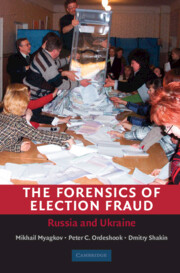6 - The United States
Published online by Cambridge University Press: 03 February 2010
Summary
Do you think that the U.S. electoral system is absolutely flawless? Shall I remind you of some election (scandals) in the States?
Vladimir Putin, December 24, 2004The statistical study of precinct-level data does not suggest the occurrence of widespread fraud that systematically misallocated votes from Kerry to Bush.
Democratic National Committee executive summary, 2005CALIFORNIA, NORTH CAROLINA, AND ARIZONA
People might argue that Russia and Ukraine are special cases, and they are right if established democracies are the benchmark. A count of ten or even three million fraudulently cast ballots, all going to an incumbent, is inconceivable today in any state we might label a stable functioning democracy. Russia's uniqueness in particular, unless compared to places like Zimbabwe or the Asian republics of the former USSR, is underscored when one reads of the regime's largely impotent political opponents being harassed, arrested, beaten, and simply kept off the ballot by a variety of pseudo-legal maneuvers or maneuvers proclaimed legal by a subservient judiciary. However, elections have not always been wholly free and fair in the United States. We recall the humorous comment by Boss Tweed in the movie Gangs of New York that his minions ignore the uncomfortable fact that they had run out of ballots and to “keep counting!” Although a fictionalized account, its humor lies in the historical truth it contains.
- Type
- Chapter
- Information
- The Forensics of Election FraudRussia and Ukraine, pp. 233 - 274Publisher: Cambridge University PressPrint publication year: 2009



